Fulfilling stay beyond any expectations
/I came to Jiwa Damai to teach Yoga and learn about Permaculture. I planned roughly to stay for a couple of weeks and ended up staying until the very last day of my 60 day visa. This place is pure magic. I felt a little challenged by the quietness the first week but my persistence paid off and rewarded me with an experience that touched me very deeply. The place itself is beyond beautiful. It is true paradise where you do not hear any man-made noise (besides the temple that you hear 3 times a day like in any other place in Bali). The nature that Margret, the owner, is protecting and allowing to flourish here is incredible and so soothing for the soul. It doesn't matter where you look you only see beauty and lushness. As if that wasn't enough already to make this place truly special, you will also meet the most amazing people.
Margret the owner has become very very dear to me over the course of my stay and I got to support her with very exciting projects. She lead an amazing meditation every evening for us and I am so grateful for having been introduced to her technique. She is also really great at picking people for the volunteer programme and the other volunteers quickly became close friends. The staff is incredible and so sweet and kind and friendly. I feel I have gained a new home and a new family with lots of new brothers and sisters, cousins, aunties and a granddad ;) I had so much fun, I learned a lot of new skills and also a lot about myself and I made meaningful and real connections with people and nature.
My heart is so full after my stay, I was not ready to leave when the visa expired and feel almost homesick now after I left. I can highly recommend staying here. If you come here with an open mind, ready to learn about yourself and ready to challenge yourself and understanding that how you perceive reality is always up to you, you will be rewarded with a very beautiful and profound experience.
This article was written by Kerstin, our volunteer. If you would like to join us, send us an email at contact@jiwadamai.net

























